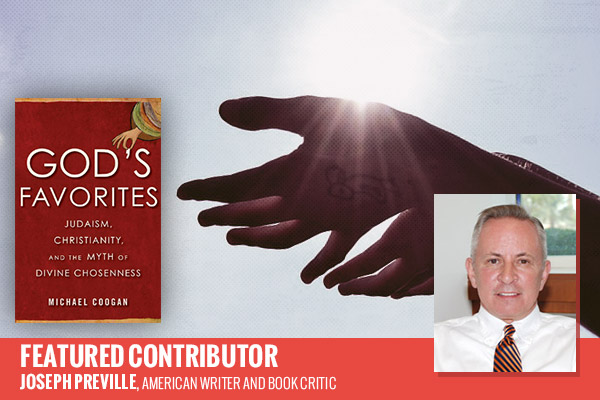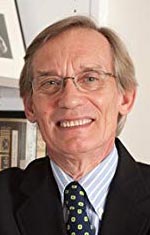
Who are God’s Chosen People? An Interview with Michael Coogan
- By Joseph Preville --
- 17 Jul 2019 --

Does God have a chosen people, and does he favor certain societies?
Distinguished biblical scholar Michael Coogan considers these questions in his provocative new book, God’s Favorites: Judaism, Christianity, and the Myth of Divine Chosenness (Beacon Press, 2019). Coogan is currently the Director of Publications for the Harvard Semitic Museum, and he has taught at Harvard University, Stonehill College, Boston College, Wellesley College, Fordham University, and the University of Waterloo (Ontario). He has participated in and directed archeological excavations in Israel, Jordan, Cyprus, and Egypt. Coogan is the editor of Oxford Biblical Studies Online and The New Oxford Annotated Bible (Oxford University Press, 2010) and the author of many books, including The Old Testament: A Very Short Introduction (Oxford University Press, 2008), God and Sex: What the Bible Really Says (Twelve, 2011), The Ten Commandments: A Short History of an Ancient Text (Yale University Press, 2014), and A Brief Introduction to the Old Testament: The Hebrew Bible in Its Context (Oxford University Press, 2015).
Who are God’s Chosen People? An Interview with Michael Coogan[/tweetthis]
In God’s Favorites, Coogan dissects what he sees as the “myth of divine chosenness” for ancient Israel and Christians in the Hebrew and Christian scriptures. He also scrutinizes the claims of chosenness made by Americans and Jewish and Christian religious Zionists. “In my view,” he writes, “gods do not choose people, either groups or individuals. Rather, people choose a god and then assert that that god has chosen them or their ancestors. The assertion enables them to identify themselves as superior to their neighbors, or their ancestors as superior to their neighbors’ ancestors. They project onto their god their own self-importance. The myth of divine choice then becomes part of the group’s tradition, frequently preserved in written form.”
Michael Coogan discusses his new book in this interview.
Joseph Richard Preville: How is your approach to biblical studies shaped by the historical-critical method? And, why do you describe your book as a kind of “thought experiment”?

In my book, I use the historical-critical method to probe the concept of divine chosenness. I call it a “thought experiment” or hypothesis, because I probe the claims of individuals and groups that they have been divinely chosen without presuming that those claims are necessarily true, even if they are found in or based on the Bible.
JRP: What is the concept of divine chosenness or election?
MC: Divine chosenness is the notion that a god has preferred one individual or one group over all others. It is a concept found in many cultures from antiquity to the present. The Babylonian god Marduk chose Hammurapi, Hammurapi himself claimed; the Roman god Jupiter chose Aeneas, the poet Virgil proclaimed; the biblical god chose David, some biblical writers asserted. Each leader benefited from the claim. If a ruler can convince his or her subjects that he or she is divinely chosen, then any rebellion against that ruler would in effect be blasphemous—a rebellion against the deity.
Groups also identify themselves as divinely chosen, and in my thought experiment I probe those claims. Just because the ancient Israelites claimed that God had chosen them does not make the claim true. The same applies to subsequent groups who applied the biblical concept of chosenness to themselves, especially Christians, Americans, and ultrareligious Zionists, all of whom I focus on in my book.
JRP: How did the Israelites become God’s chosen people, according to the Hebrew Scriptures?
MC: Because the Bible is not a single book written by a single author, divine or human, but rather a collection of books written over many hundreds of years by different authors, there is no single answer to your question. Some parts of the Bible state clearly that God chose the Israelites, or some subset of them, like the kingdom of Judah, or David and his dynasty, and so on; sometimes God himself is quoted as having done so. But other parts of the Bible give a different story. For example, in the book of Genesis we are told that Isaac and Jacob became heirs of the divine promise instead of their older brothers Ishmael and Esau because of their mothers’ schemes, that Solomon became his father David’s successor instead of his older brother Adonijah because of court intrigue, and that Persian-appointed leaders decided which worshippers of the god of Israel would be part of the chosen people and which would be excluded.
Because of my conviction that the entire Bible is the words of men, mostly, and a few women, I understand even the supposedly divine pronouncements of chosenness to be human self-aggrandizement. The individuals and groups in ancient Israel who described themselves as divinely chosen did so to enhance their own status.
JRP: How did Christians claim divine chosenness for themselves, according to their scriptures?
MC: The early Christians believed that the Jewish scriptures had predicted the life, death, and resurrection of their executed leader, Jesus of Nazareth. Because Jesus had been rejected by the Jews, some early Christian writers asserted, God had rejected the Jews as his chosen people, and Christians were now the chosen ones. So, they applied the texts about chosenness in the Jewish scriptures to themselves. For example, the words of God to Moses and the Israelites on Mount Sinai—“You will become for me a possession more treasured than all peoples”—were appropriated by the author of 1 Peter to support his claim that now Christians were “God’s own people.”
One consequence of such appropriation is the long and tragic history of Christian anti-Semitism, a history that begins in the New Testament itself. In the gospel of John, Jesus himself reportedly said that Jews who reject him have the devil as their father.
JRP: Why do Americans and Israelis claim special divine status or exceptionalism for their nations?
MC: At many times in both Jewish and Christian history, individuals and groups have applied the notion of divine chosenness to themselves and their leaders, using biblical language. Charlemagne, Napoleon, Henry VIII, and Nazi Germans are only a few of many examples. In my book I focus especially on two. The first is the United States. The Puritan settlers of New England thought of themselves as God’s new Israel, because, like the Israelites of old, they had fled persecution, crossed a body of water, and had been planted by Providence in a new Promised Land. Everything said in the Bible about the Israelites now applied to them, they thought, because now they, and only they, were the people of God. In relatively short order, this self-identification morphed into American exceptionalism, rationalizing transfer and slaughter of Native Americans and expropriation of their land, just as according to the book of Joshua the Israelites took the land of Canaan and killed many of its inhabitants. As time went on, it also justified slavery, imperial expansion, and racist immigration policies that continue to this day. It has also empowered American arrogance vis-à-vis the rest of the world.
In the Zionist movement, there have always been tensions between those who wanted a Jewish homeland for political reasons and those whose reasons were religious. Ultra-religious Zionists, both Jewish and Christian, see in the founding of the state of Israel the fulfillment of ancient biblical promises: Through Israel, they believe, the world will be redeemed. Unfortunately, the claim that God gave the whole land of Israel to the Jews means that millions of Palestinian Arabs who have also lived there for many centuries have been forced from their homes and had their land taken.
JRP: Why do you think the “myth of divine chosenness” is divisive and dangerous to peace and harmony in the world?
MC: I call divine chosenness a myth in both senses of that word: it is a story in which a deity is a principal character, and it is false. If God exists, it is inconceivable that he would prefer one group over others, for then he would not be the all-loving God whom theologians describe. If we—whoever we are—think that God has chosen us, then we can also think of ourselves as superior to everyone else. We can persecute them, dispossess them, kill them, treat them any way we wish, because God is on our side. But rejecting this myth and its consequences is consistent with one of the Bible’s highest principles—loving one’s neighbor. Adhering to that principle is, fundamentally, the only way to achieve global peace and harmony.
JRP: Do you see any signs that tribalism is strengthening or fading away in the world today?
MC: On the one hand, there is a movement toward greater global unity, as is evident, for example, in the Paris Agreement on climate. But there are also centrifugal forces that threaten that growing unity. One is the current administration’s insistence on going it alone, a logical consequence of American exceptionalism and to some extent of the endemic racism that has been called America’s original sin. To be sure, such tribalism is not exclusively American. We see it being played out, for example, in nativist policies in some countries of the European Union—ironically founded in part to combat tribalism—as well as in too many other places worldwide. We need to insist that we are all one tribe, one species, and that none of us is specially chosen or intrinsically better than anyone else.


















